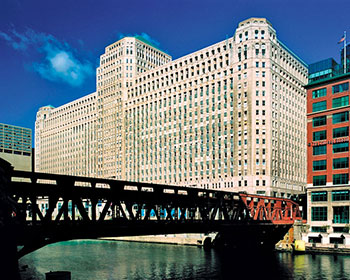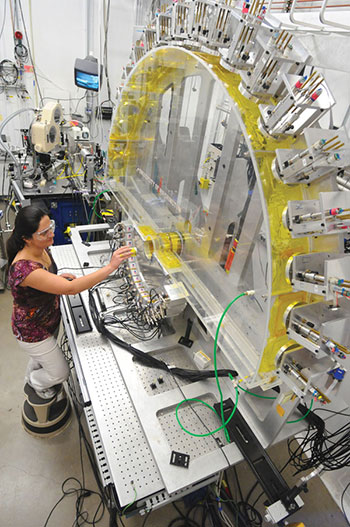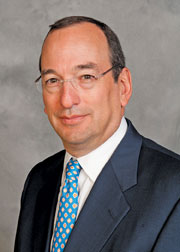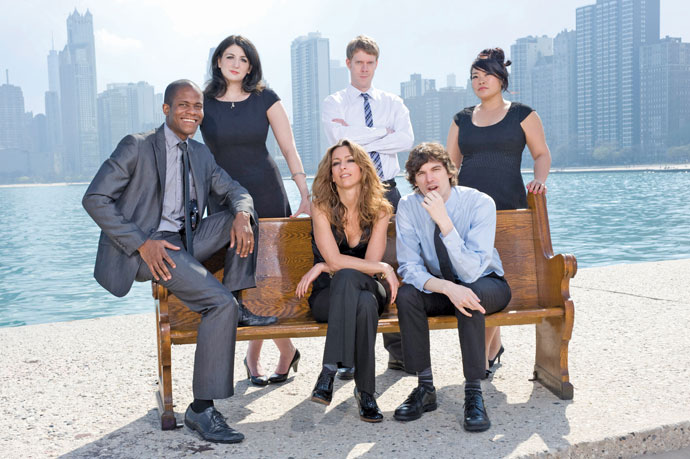‘Satirists Draw Scorn For Creating Actual Jobs.’ “No way to treat loyal scoffers,” says straight-faced applicant.
So might read a headline treatment from satire kingpin The Onion about its own move of corporate operations to Chicago, where the family of publications and other media ventures is relocating some 100 employees to offices and studio space in River North. That’s the same area where SalesForce.com is adding 200 jobs to its own operation.
“The Onion is very happy to return to its Midwestern roots,” said Steve Hannah, president and CEO of Onion, Inc., last July, “and especially happy to land in Chicago. Our brand of journalism has a peculiarly Midwestern sensibility and, combined with the state’s generous tax credit for video production, we feel that we have landed in the right place.”
“From its spot-on satire of our politics, to its use of our Web video tax credit, The Onion shows that Illinois is a great place to do business and that Chicago is a great comedy town,” said Illinois Lt. Governor Sheila Simon.
Indeed, the theatrical and comedy “industry cluster” represented by such anchor institutions as The Second City, iO (formerly ImprovOlympic) and the Steppenwolf Theater Company continues to thrive. But the improvisational spirit such institutions cultivate may be as useful a tool as the city’s famous TIFs, sparking positive energy in other sectors, as well as in the city’s team-driven approach to economic development.
Built In Chicago’s 2012 Digital Startup Report, released in early February, revealed that 197 digital startups were launched in the city in 2012, up from 193 in 2011.
A total of 59 companies secured funding of at least $1 million in 2012, an increase from 44 companies in 2011. The largest growth in funding was in the healthcare technology sector, with 27 percent of the 2012 startup funding going to digital healthcare companies.
“The increasing importance of digital to Chicago’s economy has been recognized by government, media, large corporations, major universities and investors from around the country,” said Matt Moog, founder and CEO of Viewpoints and founder of Built In Chicago. The activity in Chicago has also attracted more than 50 investors from outside Chicago to invest in the city’s digital startups in 2012.
“Chicago has developed into a city that every investor must watch,” said Chicago Mayor Rahm Emanuel, the former White House chief of staff. “Our economy is thriving and the companies we are producing are among the nation’s leaders in many sectors, and this year’s data proves it.”
A Cast of Thousands
But you don’t have to be a startup to start something in Chicago. Witness the cast of marquee corporate projects to hit town in the past year alone. According to MB Real Estate, in 2012, 10 suburban-based companies signed leases to occupy a combined 886,000 sq. ft. (82,309 sq. m.) in the city’s central business district.
— Bob Clark, Clayco founder, CEO and chairman
Clayco is moving its headquarters from St. Louis. The company currently has about 1,000 employees total, with 280 employees in the Chicago office and the field. Clayco expects to nearly double that Chicago number in the next couple of years by adding new architects, designers and project managers; expanding its concrete and infrastructure business in Illinois; and continuing growth through acquisition. “Clayco is embarking on an exciting period in our company’s history,” said Clayco founder, CEO and Chairman Bob Clark. “With a record backlog of projects, and increasing travel around the country and the globe, we see Chicago as an integral part of our expansion strategy as we add talent and build Clayco into the nation’s leading full-service real estate development, architecture, engineering and construction firm.”

Law firm McDermott Will & Emery just signed a letter of intent to be the anchor tenant at River Point, a downtown Chicago office tower designed by Pickard Chilton that is being developed by Hines and Ivanhoé Cambridge. The project broke ground Jan. 15 and is expected to be complete by spring 2017.
Image courtesy of River Point
Global financial services firm Guggenheim Partners plans to increase its Chicago headcount by more than 200 employees in the next 18 months, beginning with the relocation of employees from its office in suburban Lisle to its downtown Chicago headquarters. KPMG is investing $165 million at Aon Center and adding 500 jobs to its regional headquarters there. Hillshire Brands (formerly Sara Lee Corp.) is moving its 600-person headquarters from suburban Downers Grove to the West Loop. Federal Savings Bank from Overland Park, Kan., is locating a 400-job home loan center in the city. Germany’s ThyssenKrupp is establishing a 100-person HQ in the Loop. Google‘s Motorola Mobility is moving its 2,500-person HQ to the Merchandise Mart. Capital One announced that it will be relocating multiple Chicagoland locations into 65,000 sq. ft. (6,039 sq. m.) on West Wacker. Nokia is moving a mobile phone Internet services division from suburban Itasca, bringing 150 jobs downtown. And GE Transportation last May announced it would move its global headquarters from Erie, Pa.
“We have transformed GE Transportation from a North American rail company to a truly global transportation business,” said Lorenzo Simonelli, president and CEO of GE Transportation. “Chicago allows us to more efficiently reach and serve customers around the world in the rail, mining and marine industries.” The company will relocate about 50 people from Erie to Chicago over the next two years, and anticipates having a headquarters staff of approximately 150 in Chicago by 2014.
“Under the leadership of Mayor Emanuel, Chicago has continued to foster a dynamic work force, an entrepreneurial spirit, and a culture of innovation, exploration and commercialization which provides a strong foundation for Dow’s Midwestern Regional Sales Center,” said Andrew N. Liveris, Dow Chemical chairman and CEO, at the center’s official opening in December 2012. Dow expects to bring hundreds of jobs downtown over the next several years.
Like most of the others mentioned above, Dow’s project received no incentives. Tom Alexander, assistant press secretary for Mayor Emanuel, says the primary driver behind all the projects isn’t incentives. It’s the work force.
“We only have used financial incentives in the form of TIF in two or three cases for corporate relocation,” he says of an administration that has welcomed projects from 70 companies pledging 25,000 new jobs. “What people are mostly interested in is the talent. People want to work someplace where they want to live. And they want to live in cities right now. The value proposition is if we have the most talented people, companies will come.”
Emanuel’s administration is focused precisely on creating an environment where that bright and energetic work force wants to be. His team, working with World Business Chicago, has formulated a comprehensive Plan for Economic Growth and Jobs, and has also founded the Office for New Americans to welcome and facilitate citizenship and business processes for the city’s diverse immigrant population. The “Building a New Chicago” program launched in 2012 features $7.2 billion in funding over just the next few years, including $4 billion in the Chicago Transit Authority. Starting in September 2012, Millennium Park began offering free wireless Internet to the public, and as part of the city’s Broadband Challenge initiative, all parks and open spaces in Chicago will eventually offer free Internet. “The investment in infrastructure is front and center,” says Alexander, “and I think companies are intrigued by that.”

In addition to welcoming the headquarters of GE Transportation in 2012, Chicago also will welcome GE Appliances’ Monogram brand, as it opens its first Midwest design center location in Chicago at LuxeHome in The Merchandise Mart in March 2013. The Merchandise Mart will also be home to Google (Motorola Mobility), which announced last August it will move its 2,500 staff members from a campus in suburban Libertyville to 572,000 sq. ft. (53,139 sq. m.) downtown.
Photo courtesy of GE
They’re also intrigued by such programs as the city’s College to Careers program, which involves matching the city’s seven community colleges’ curricula to needs in demand by the private sector, including specific curricula geared to healthcare, transportation and logistics, IT, and culinary and hospitality business. “We’re already seeing an uptick in enrollment as well as in the graduation rate,” says Alexander. “Companies love it. There are 125,000 students in our city colleges, which is more than all the four-year institutions in the city.”
Alexander notes that the industry recruitment battle is not necessarily with the suburbs or Indiana and Wisconsin, but with the globe. Google’s Motorola Mobility location decision — which comes as the firm slashes 4,000 jobs globally — came down to Chicago vs. California and Beijing. “The city and state worked together to convince Motorola that Chicago was the place to be,” he says. “We needed to keep those jobs in Illinois. A strong Chicago begets a strong region. The mayor fought like crazy to get them to come here.”
Completing the Circle
The best business ecosystem case study in recent months involves not corporate offices or services, but good old Chicago manufacturing. Smith Electric Vehicles announced Nov. 28, 2012, that it would open a manufacturing plant in the city, creating hundreds of direct and indirect jobs. The decision was influenced by the Emanuel administration’s innovative voucher system created to accelerate the conversion from diesel to EVs, the large number of fleets interested in vehicle electrification, and the development incentives made available to Smith. Chicago will be Smith’s third location in the United States, joining their headquarters in Kansas City, Mo., and a manufacturing facility in New York City.

Argonne assistant materials scientist Swati V. Pol studies lithium-ion batteries at the Advanced Photon Source, one of several facilities at Argonne, other national labs and universities that form an integral part of the new Joint Center for Energy Storage Research announced by the U.S. Dept. of Energy in late November.
Image courtesy of Argonne National Laboratory
One day prior to the announcement, the Chicago Dept. of Transportation announced a comprehensive, $15-million incentive program that will encourage companies and individuals to modernize their fleets and convert to electric vehicles. The first of its kind in the U.S., the plan rewards fleets on an increasing scale for replacing their most diesel-consuming vehicles. The program’s initial $15M is funded by resources from the federal Congestion Mitigation Air Quality (CMAQ) program and will provide vouchers to assist companies in reducing the costs of converting their vehicles to electric. The City is also considering additional incentives such as preferential loading zones and decreased registration costs to complement the voucher program. Fleets can stack the State of Illinois’ Alternative Fuel Vehicle and EV Charging Station Rebates on top of the city’s incentive.
Through similar federally funded incentive programs, the City has helped deploy 404 cleaner vehicles, including 159 compressed natural gas (CNG) livery/taxi vehicles and 223 alternative fuel stations, including 17 CNG and 202 electric vehicle charging stations — the densest network of any major city.
“A mass urban deployment of commercial electric vehicles is an important next step in catalyzing mainstream adoption,” said Smith CEO Bryan Hansel. “Chicago’s location, commitment to adoption in municipal fleets, concentration of commercial vehicles, talented workforce and importance to the global business community make it a perfect choice to grow our company and this industry. The leadership being shown with the mayor’s CDOT voucher program is a prime example of how Chicago is creating the template for a new energy city.”
Two days after the Smith announcement, on Nov. 30, the U.S. Department of Energy selected a team of five national labs led by Chicago’s Argonne National Laboratory to host the Joint Center for Energy Storage Research, with an award of up to $120 million to be invested over five years to establish a new Batteries and Energy Storage Hub.
“The selection of Argonne to serve as the base camp for advanced battery technology research is further confirmation that Mayor Rahm Emanuel and his administration are making great strides in positioning Chicago as the global hub for the growth of the electric vehicle industry,” said Smith’s Hansel, “and we are proud to be part of it.”
“The project promises to have a significant economic impact across Illinois with the help of towns and businesses who have already agreed to partner on the commercialization of promising technology developed at the hub,” said U.S. Senator Dick Durbin.
Illinois Gov. Pat Quinn is providing $5 million through his Illinois Jobs Now! capital construction plan to help build the state-of-the-art JCESR facility. Quinn also has committed to working with the General Assembly to provide an additional $30 million in future capital funding for the building. Private-sector partners for the hub include the aforementioned Dow Chemical Co., Applied Materials, Johnson Controls and Clean Energy Trust. The hub’s university partners include the University of Michigan and four Illinois institutions: Northwestern University, the University of Chicago, the University of Illinois-Chicago and the University of Illinois-Champaign.

Longtime Credit Suisse executive Steve Koch is deputy mayor of the City of Chicago.
“All of these pieces fit together into a comprehensive strategy that will allow Chicago to lead in this industry, from conception to construction to implementation,” said Emanuel of the sequence involving his voucher program, Smith’s project and the DOE center. “I will continue to work to attract more companies, create more jobs and foster more economic development in this crucial space.”
Steve Koch has held a number of senior leadership roles in the mergers and acquisitions and investment banking department during his 27 years at Credit Suisse, and helped Emanuel’s transition team navigate the city’s fiscal challenges. Last fall he took over as the city’s deputy mayor from former R.R. Donnelley CEO Mark Angelson. Koch says the city continues to be “a terrific location for data-heavy financial services,” especially when speed, power availability, low data latency and access to the data grid are key factors.
“Any serious observer of the industry understands it’s going through some very dramatic change, and as a result, it’s hard to predict what will be the engine of the future,” says Koch. “We have a lot of the ingredients that are likely to make us successful going forward. But I’ve spent enough time in financial services to know you never declare victory. Change is constant and rapid.” So are changing perceptions. Koch thinks the city needs to increase its stature on the international stage.
“If you’re talking about non-U.S. business people thinking about the U.S., I think we’re not top of mind,” he says. “We’re in the next frame. My job and our job is to make us top of mind.”
Tourism helps. Mayor Emanuel’s sometimes brash and always straightforward style helps too. As Tom Alexander puts it, “The mayor’s viewpoint is that Chicago should not be an option, but a ‘must go.’ “
“He’s very plain-spoken, and people like that,” Koch says. “Business people respond very well. He’s very focused on the topic. And he’s not new to it — he spent some time as a banker. He’s got a very ‘out there,’ direct personality, and most people find that’s something they relate to. In the business community, it works extremely well. Either they know him and expect it, or it’s like, ‘Wow, this guy’s telling us stuff, not just old recycled platitudes.’ He’ll call the executives and check in. He has that history and personality where it’s no different than any other business relationship — people like the fact somebody cares about them and wants to know what they think.”
